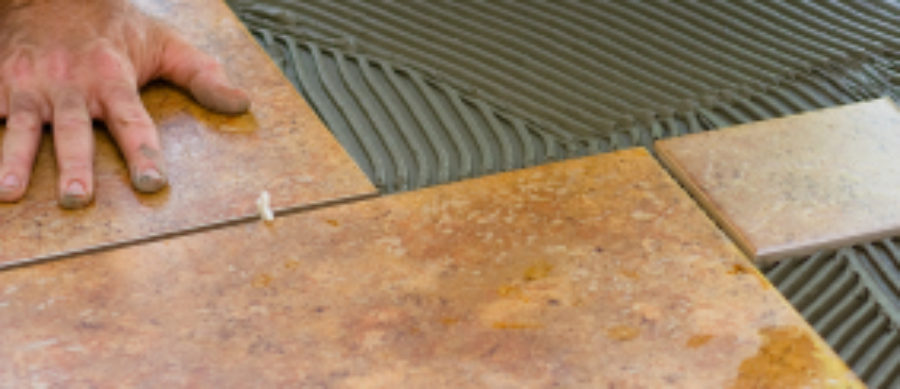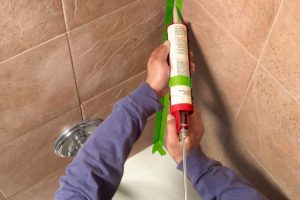Tile installation costs start at $10 to $14 per square foot based on tile type. Peak rate is about $18 per square foot.
The least expensive jobs require little preparation and use large tiles. The cost of tile installation rises as complexity increases and tile size gets smaller.
In this tile cost breakdown we are going to focus solely on the installation cost for tile – the labor charges only – and look at the many variables that can affect price. We’ll show you how to calculate a reliable estimate for your own project before you start getting quotes from local contractors.
Each cost factor and how it affects price is explained below.
Determining Fair Cost to Install a Tile Floor
Tile installation is a competitive business. Tile setters know that you’ll likely get estimates from several installers before hiring one.
Most tile contractors need a net a profit of about 15 percent on installation costs to stay in business. They take one of two approaches:
- Price jobs competitively (12 to 18 percent profit) and try to stay busy.
- Price jobs for a 25 to 30 percent profit, get less work, but make similar total income.
Before we get to tile installation cost factors, let’s examine costs you might not have considered. All potential costs are summarized in a table below.
Floor Leveling Cost
Repairs might be required to the existing floor before tile or a suitable subfloor can be added.
Low spots in any flooring type are eliminated with self-leveling underlayment mix. A latex primer-sealer is rolled onto the low area to improve adhesion. If the deck is OSB or plywood, joints must be filled with caulk first.
Primer sealer costs about $14 per quart. The leveling underlayment price is $35 per 50lb bag. One each should be enough to cover low spots in areas up to 150 square feet, based on the depth of the hollows.
Labor cost is most of the total expense.
- Self-leveling underlayment material & installation cost: $4.85-$6.50 per square foot of affected area
Floor Sheathing Repair Cost
The sheathing is the material fastened to the floor joists, usually plywood or OSB. Sections of soft, water-damaged material must be replaced.
OSB and plywood for flooring range in cost from $22 to $26 per 4×8 sheet, so $0.80 or less per square foot. Glue and screws or nails are a small expense. This is another labor-intensive job.
- OSB and plywood subfloor repair cost: $3.50-$5.00 per square foot of affected area
Underlayment Installation Cost
A concrete floor in “perfect” condition might not need a specialty subfloor for tile. Very flat vinyl that is fully glued rather than perimeter glued might also work.
All other materials require the installation of underlayment.
There are three common subfloor materials to consider.
Self-leveling underlayment, discussed above, is the cheapest material. When poured over the entire surface, tile can then be fixed directly to it. Most concrete brands like Quickrete and TEC make self-leveling underlayment. When the entire floor is covered, rather than just low spots, cost drops to about $4.25 per square foot.
Cement board underlayment (CBU), or backer board, is the most popular underlayment. Installers are familiar with it and know how to properly use it. Hardiebacker, PermaBase and US Gypsum are common brands. Sold in 3×5 sheets, cost is $0.60 to $1.25 per square foot depending on whether you use ¼” or ½” board. Installed cost with fasteners and labor is $3.25 to $4.75 per square foot.
Uncoupling membrane Schluter-DITRA has the advantage of being waterproof. It is also the thinnest, ideal for use where you don’t want height buildup. DITRA (1/8”) and DITRA XL (5/16”) cost $1.35 to $2.15 per square foot for the material. Installed cost is $3.00 to $4.00.
- Tile underlayment material & installation cost: $3.00-$4.75 per square foot
Our guide to Schluter-DITRA has comprehensive information about this unique material. It includes benefits, uses and a comparison to CBU that will help you select the right material for your project.
Tile Installation Cost Factors
An experienced estimator will quickly survey the area to be tiled and the material to be used. They’ll make measurements, crunch the numbers, and produce a written tile installation price estimate.
Tile installation labor cost starts at $10.00 per square foot and rises to $18.00 from there.
Obvious factors that might affect the tiling estimates you get include:
- The reputation of the installer, as noted
- Cost of living in your area
- Availability of experienced installers
Additional factors affecting where on that price range your estimate will fall are next.
Size of the job – Small jobs like a half-bath floor cost more per square foot than large jobs like a kitchen with an eating area. This is because each job has fixed costs such as fuel cost, paid travel time to and from the site and paid time to set up and take down equipment. The bigger the job, the more the fixed costs are spread out, so cost per square foot goes down.
Size of the tile – Small tiles take longer to install. Floors made up of small tiles require more spacers and grouting. More pieces must be handled to cover the same space. As a result, installation cost is higher for small tiles and drops as tile size goes up.
Room sizes – Cutting tile to fit against walls and around jambs is time consuming, driving up cost. There are more linear feet of wall and more door jambs in multiple small rooms than in one large room.
Obstacles – Walls and doorways aren’t the only obstacles that increase time and cost. The same is true of vanities, cabinets, hearths, stairways and more. If the area being tiled is something like an open laundry area with one drain, cost will be lower than for a bathroom with multiple obstacles.
Transitions – A transition is required where two separate flooring types meet. If not included in the estimate, the transition piece might be itemized at about $2-$4 per lineal foot for large transitions or $15 to $20 apiece at doorways.
Stairs – Most tile setters don’t recommend putting tile on stairs unless they are concrete or have been framed for tile. Standard wood-framed stairs flex. Flexing cracks the grout.
If the stairs are constructed to hold tile, expect labor to be priced at a premium of up to 100% due to the large about of tile trimming needed.
Material – Ceramic is easiest to cut, so prices start at about $4/sq.ft. Porcelain tile is harder, and cost begins at about $5. Stone tile is the most difficult to cut and costly in terms of saw blades needed, so installation starts at about $6.
Design – Standard tile layout comes with a standard cost. Diagonal designs boost cost by 15 to 20 percent. Mixing small and large tiles or adding a border of another type tile increases price too. Truly custom designs, like a dramatic sunburst in an entryway or crest at the foot of stairs, come with top cost.Need Flooring Advice or a Free Quote?We’ve Got Pros in Your Area!Click Here
To Get Started
Tile Installation Cost
Near the beginning of this article, we said tile installation costs range from $4 to $15 per square foot, with $8.50 being average.
Average: Examples of projects that might be priced near the $10.00 per square foot average are:
- A master bathroom or foyer with just a few obstacles
- A large kitchen with cabinets, an island, breakfast bar peninsula and multiple floor grates to work around
Low cost: Your cost will be on the low end if you’re covering 300 square feet or more in large tile and there are few obstacles. Having several competing tile contractors near to you can limit cost too.
High cost: Two factors that drive cost toward the high end fastest are installations with a large amount of trimming and custom tile designs.
Extra Costs in Tile Flooring Installation Estimates
Emptying rooms and removing old flooring are necessary tasks when preparing for new tile.
Removing old flooring – Tile on concrete is very difficult and costly to remove. Carpet and pad are easy to remove, as is perimeter-glued vinyl. Ask you tile installer about fully glued vinyl in good condition. It’s possible the new subfloor and tile can be installed over it. Depending on the material, here are associated costs.
- Old flooring removal cost: $0.20-$0.40 per square foot for most materials and up to $1.50 for tile on concrete.
- Disposal of used flooring: Up to $0.25 per square foot, possibly more for tile.
Moving furniture and appliances – The number and weight of things moved determines cost.
- Moving furniture and appliances: $25-$125 per room
- Disconnecting and reconnecting gas or water lines: $15-$30 per appliance
Cost Summary Table
This table summarizes the tile installation labor costs discussed above with cost factors and extras.
| Task | Cost | Factors |
| Floor Leveling | $4.85-$6.50/sq.ft. | Amount of material needed, size of low areas |
| Sheathing repair | $3.50-$5.00/sq.ft. | Material used, degree of damage |
| Underlayment Installation | $3.00-$4.75/sq.ft. | Material used, amount of trimming |
| Basic tile flooring installation | $10.00-$14.00/sq.ft. | See Tile Installation Cost Factors above |
| Transitions | $2.00-$4.00/linear ft. | Material used, length and shape of transition |
| Moving furniture/appliances | $25-$125 per room | Number, weight and delicacy of pieces |
| Appliance connections | $15-$30 | Type (electric, gas, water), weight |
| Old flooring removal | 20-35 cents/sq.ft. | Type of flooring, how it is fastened |
| Old flooring disposal | 20 cents to $1.50/sq.ft. | Local disposal costs and availability of free recycling |
Saving Money on Tile Installation Costs
Existing homes: You can reduce cost in two ways. First, by removing the old flooring. Most flooring, even laminate and newer vinyl materials, can be recycled at no cost. That’s a cheap choice when a center that will take the material is nearby.
The second cost-saving step is to empty rooms and handle appliance disconnects and re-connects. Leave it to the tile contractor if you’re unsure of how to do it safely and correctly.
New construction: If you’re planning a home or addition, the floorplan you chooses can affect flooring installation cost for all materials.
Flooring installation costs are lower in open plans with minimal obstacles to trim around.
Any home: Finally, homeowners that shop around for the best price save the most money. We recommend getting written estimates from three or four tile contractors.
Let them know that you are getting several bids. Unless they are so busy that they don’t need the work, most will write competitive estimates.
Protect yourself in the process by being wary of lowball offers and what’s behind them. If the work is done improperly, appearance of the floor will suffer, and it will cost you money in future repairs that could have been avoided.
Be sure any company you hire has a reputation for skilled tile setters, excellent work and fair prices.







Leave a Reply
Your email is safe with us.